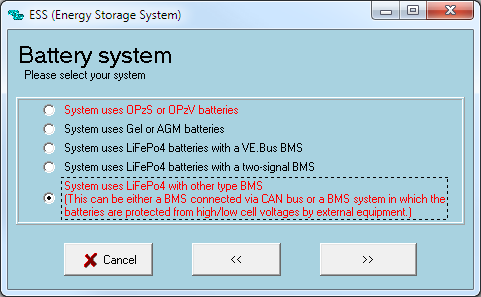Table of Contents
Victron & BMZ
The combination of Victron products with the BMZ ESS battery has been tested and certified by the R&D departments. The combination is actively supported by both companies.
Compatible BMZ models:
- ESS 7.0
- ESS 9.0
- ESS X
- ESS Z
1. Introduction
1.1 Compatible Victron products
All 48V Multis and Quattros. And always a GX device is necessary in the system, since that has the canbus port which is used for the (required!) communication between the ESS battery and the Victron system.
1.2 Notes
- BMZ batteries can only be used in a Victron ESS installation installation that uses the ESS Assistant.
- Paralleling multiple BMZ ESS batteries to expand capacity is possible. Contact BMZ for more information.
- Derating, based on the dynamic BMZ ESS charge- and discharge limits:
- Minimum GX device version is v1.72
- The derating mechanism is not very precise yet. In other words, do not expect a discharge limit of 30A to result in a precise discharge of 30A.
- Actual charge- and discharge limits are visible in the Parameters page. See screenshot below in Chapter 4.
- BMZ batteries and MPPT Solar Chargers with a VE.Can communication port cannot be both connected to the CCGX, because of different canbus speeds. Use a Cerbo GX, or Solar Chargers with a VE.Direct comm. port instead.
1.3 System diagram

2. GX device needed
To use the BMZ ESS in Victron system, it is necessary to use a Color Control GX or Venus GX. On first commissioning an external power supply (Not the 48V from the BMZ-Battery) is needed. The GX device sends a keep alive signal to the BMZ ESS via canbus. This will only be send once the canbus baud rate is changed (see 5. GX device Configuration). Without it, the battery will have a communication fault and shut down after 10sec.
3. Wiring of communication cables
Use the VE.Can to CAN-bus BMS type B Cable, part number ASS030720018. Plug the side which is labeled Battery BMS into the BMZ BMS. Plug the side labeled Victron VE.Can into the GX device.
Then, plug a VE.Can terminator in the other VE.Can socket on the GX device. Two VE.Can terminators are included with the package of the GX device as an accessory, only one is used. Keep the other one as a spare.
More information about the cable can be found in its manual.
Without properly connecting this cable, the battery will stop charging/discharging after several minutes. Also, the battery will not show up on the display of the GX device.
4. VEConfigure settings
4.1 General tab
- Check “Enable battery monitor”
- Enter the battery capacity:
- BMZ ESS 7.0 - 121.5 Ah
- BMZ ESS 9.0 - 156.6 Ah
- BMZ ESS X - 186.3 Ah
- BMZ ESS Z - 162 Ah
- The other parameters (“State of charge when bulk finished” and “Charge efficiency”) can be left to their default setting. They are not used in this setup.
4.2 Charger tab
| Parameter | Setting |
|---|---|
| Battery type | Lithium |
| Charge curve | Fixed |
| Absorption voltage | 60.75 V |
| Float voltage | 60.00 V |
| Absorption time | 1 Hr |
Note: make sure to double check the float voltage after completing Assistants, and if necessary set it back to 60.00 V.
4.3 ESS Assistant
Select the fourth battery type:

Then:
- Do not change the dynamic cut-off values, they have already been set correctly after selecting the lithium battery type.
- Sustain voltage: 50V
- Same for the restart offset: do not change that.
5. GX device Configuration
- Select the CAN-bus BMS (500 kbits/s) CAN-profile in the GX device. Menu path: Settings → Services → CAN-profile. Note that this changes the function of a VE.Can port: it is not possible to connect both VE.Can products and a BMZ battery together on a Color Control GX. It is possible on the Venus GX.
- After properly wiring and setting up, the BMZ ESS will be visible as a battery in the device list:

- The parameters option within the battery page shows the actual battery charge and discharge limits:

6. DVCC Settings
Enabling DVCC changes a GX device from a passive monitor into an active controller. The available features and effects of enabling DVCC depend on the type of battery used. The effect also depends on the installed Victron components and their configuration.
This table shows the recommend settings for different battery types:

DISQUS
~~DISQUS~~
 Add this page to your book
Add this page to your book  Remove this page from your book
Remove this page from your book  Manage book (
Manage book ( Help
Help